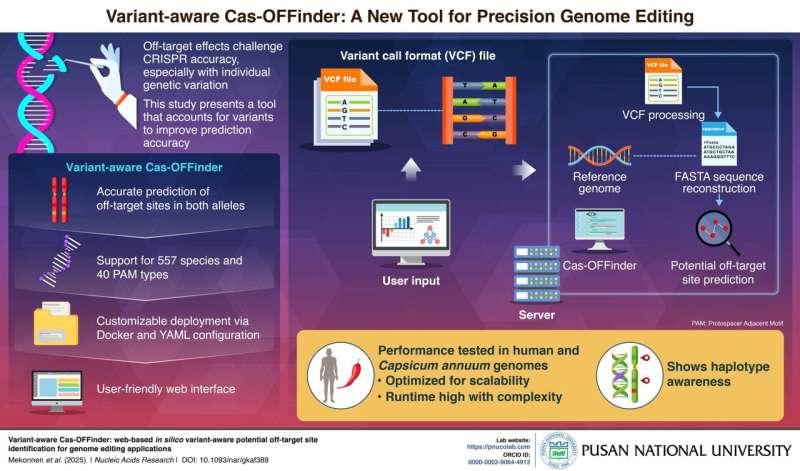
Genome editing technologies like CRISPR-Cas9 have revolutionized fields such as biology, medicine, and agriculture by enabling precise modifications to DNA. However, a significant challenge persists: unintended edits at off-target DNA sites, which can result in harmful mutations. These off-target effects are notoriously difficult to predict due to their dependence not only on the guide RNA but also on the unique genetic makeup of each organism.
On July 1, 2025, researchers at Pusan National University announced a breakthrough in addressing this issue. Led by Professor Jeongbin Park, the team developed Variant-aware Cas-OFFinder, a web-based tool designed to improve the accuracy of off-target site predictions by accounting for individual genetic variations. This innovative approach marks a significant advancement in personalized genome editing.
Addressing Genetic Diversity in Genome Editing
Most existing prediction tools rely on a standard reference genome, often overlooking crucial variations such as single nucleotide polymorphisms (SNPs), insertions, and deletions that can vary across individuals and alleles. The Variant-aware Cas-OFFinder tool, however, incorporates these genetic differences directly into its predictions.
According to co-first authors Abyot Melkamu Mekonnen, a Ph.D. candidate, and Kang Seong, a master’s student at KAIST, “It is very rewarding to know that the technology we developed can be of practical help in correcting individual genes.” Their study, which was conducted at Pusan National University, was published online on May 8, 2025, in the journal Nucleic Acids Research.
Technical Innovations and Applications
The Variant-aware Cas-OFFinder tool accepts phased single-sample VCF files and supports GPU acceleration, making it applicable beyond standard model organisms. By reconstructing allele-specific genome sequences, the tool performs haplotype-level analysis, offering a detailed and accurate picture of potential off-target effects.
“In my view, genome editing tools should be as individualized as the genomes they target,” says Prof. Park. “Our tool lays the groundwork for more accurate and personalized editing strategies.”
The team tested the tool on human and sweet pepper (Capsicum annuum) genomes using public and cultivar-specific sequencing data. In humans, it revealed off-target sites on chromosome 10 that were absent from the standard reference genome. In sweet pepper, it identified distinct allele-specific off-targets, which could be valuable for plant breeding.
Comparative Analysis with Existing Tools
Compared with existing tools like Cas-OFFinder and CRISPRitz, the Variant-aware Cas-OFFinder consistently identified unique off-targets caused by small variants such as insertions and deletions. Although it does not yet detect large structural variants, it supports 557 species and 40 PAM types, and is fully customizable through YAML files.
“Precision genome editing requires precision tools,” remarks Prof. Park. “We believe Variant-aware Cas-OFFinder will play a central role in developing safer, more effective CRISPR therapies and agricultural applications.”
Future Implications and Availability
The tool is available both as a user-friendly web interface and a command-line version. Its source code, benchmark tools, and example datasets are freely accessible on GitHub and Zenodo. While its haplotype-level analysis may slightly slow performance compared to earlier tools, this trade-off allows for greater accuracy and reliability in genome editing research.
This development represents a significant leap forward in the quest for precision in genome editing. By accommodating genetic diversity, the Variant-aware Cas-OFFinder tool not only enhances the accuracy of CRISPR applications but also paves the way for more personalized and effective interventions in both medical and agricultural fields.
For more information, the study by Abyot Melkamu Mekonnen and colleagues can be found in the journal Nucleic Acids Research with the DOI: 10.1093/nar/gkaf389.







